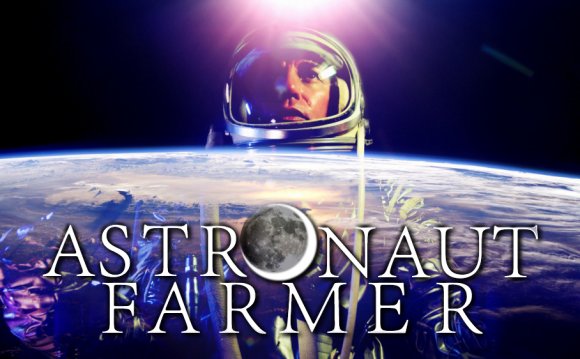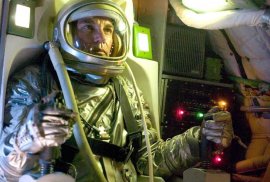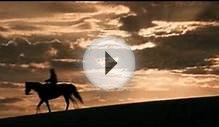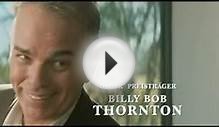
 Actor Billy Bob Thornton portrays Charles Farmer in Warner Bros. Pictures' family film “The Astronaut Farmer.”
Actor Billy Bob Thornton portrays Charles Farmer in Warner Bros. Pictures' family film “The Astronaut Farmer.”
It's a story that should be familiar to any space exploration enthusiast.
In spite of the obstacles, including the laws of physics, political pressure and a limiting budget, a small but spirited group launches their dreams. It's the story behind the current New Space movement. It's the story behind NASA's past and future.
It's the story of "The Astronaut Farmer." [IMAGES: View scenes from the film.]
A man, his horse and his rocket
Charles Farmer - portrayed with just the right mix of quirkiness and sentimentality by actor Billy Bob Thornton - was well on his way to being an astronaut when he gave up on his dream of flying in space to return to his family's Texas ranch . Years later, he is married to a supportive and beautiful wife (Virginia Madsen) and together they have three children.
Farmer's fascination with space is far from a distant memory, though. His first born, a son, is named Shepard after the nation's first astronaut. Farmer has acquired his own vintage spacesuit, which he is happy to wear for a visit to his daughter's classroom.
And oh yes, he's built a rocket in his barn .
Not a model rocket, of the type many astronaut-hopefuls build and launch from cardboard tubes and balsa wood fins, but a towering, faithful and hopefully working replica of NASA's first man-rated orbital booster, the Mercury-Atlas.
It is here that we, the audience, join Farmer as "The Astronaut Farmer" begins. We don't know how he built the rocket, though we learn it was at a great expense. And if his financial troubles aren't enough of a challenge, Farmer has just drawn the attention of the Federal Aviation Administration (FAA), which doesn't quite know what to make of the ex-astronaut turned cattle rancher, but is adamant about dashing any dreams of Farmer's rocket ever leaving the ground.
NewSpace vs. NASA vs. the nation
Farmer's plight could easily be interpreted as analogous to the NewSpace movement. Privately funded rocket developers seeking to launch private payloads and space tourists know all too well the struggles presented by tightening budgets and political regulation. It was only within the past several years that the industry and government have come to agreements that allow forward movement on the development of private space-bound rockets.
"Farmer's" FAA is far less forgiving, though those in the industry may find familiarity with actor J.K. Simmons' portrayal of agency chief Jacobson.
A stronger parallel between the film and real life is far subtler.
Farmer's success or failure is based on his belief in a dream. As he passionately defends his flight plan, Farmer says, "If we don't have our dreams, we have nothing."
Beyond any of the justifications given for NASA's present and future programs is the hope of a better future for humankind. Like Farmer, NASA faces the challenges of engineering new designs based its prior successes, a shrinking budget and a government that seems pre-occupied with deconstructing the past rather than exploring the future.
RELATED VIDEO




 Bruce MacLeish Dern (born June 4, 1936) is an American film actor. He also appeared as a guest star in numerous television shows. He frequently takes roles as a character actor, often playing unstable and villainous characters. Dern has appeared in more than 80...
Bruce MacLeish Dern (born June 4, 1936) is an American film actor. He also appeared as a guest star in numerous television shows. He frequently takes roles as a character actor, often playing unstable and villainous characters. Dern has appeared in more than 80...








